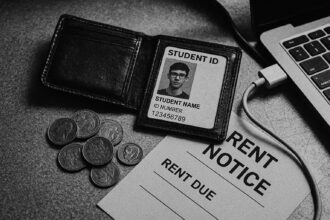The traditional concept of a gap year faces scrutiny as economic realities shift, prompting experts to advocate for a more structured and meaningful approach.
The traditional gap year, once celebrated as a period of personal growth and exploration for students before embarking on their university journeys, is increasingly viewed as an outdated concept that may pose more challenges than advantages in today’s economic climate. This shift is elaborated upon by Owen O’Neill, Founder of Uni Compare, highlighting the evolving landscape that young individuals encounter when considering a break from education.
In an interview with Wales Online, O’Neill stated, “What worked for previous generations simply doesn’t align with today’s economic and educational realities. The idea of taking a year off needs to be examined in light of what’s happening in employment markets and higher education.” He indicated that the economic pressures faced by young people today are significant and multifaceted. The costs associated with gap years, which traditionally would include travel and living expenses, now encompass opportunity costs, including potential earnings that could be accrued during that year.
O’Neill elaborated on this notion, asserting, “When you calculate the true cost of a gap year now, you need to include lost potential earnings, delayed career advancement, and a year’s worth of inflation eating away at your savings.” With living costs outpacing wage growth and increasing uncertainties regarding student debt, many students find that they can no longer afford the luxury of a gap year.
Research indicates that obtaining a university degree significantly improves earning potential, with graduates earning approximately £10,000 more annually than their non-graduate counterparts. Thus, delaying education by a year could result in missing out on not only a starting salary but also on a year of professional progression and possible raises.
O’Neill also referenced changing employer attitudes towards gap years, noting that hiring managers today may perceive such breaks as potential red flags—questioning a candidate’s commitment to an employer. “Many hiring managers now see gap years as a potential red flag rather than a selling point,” he explained. “They question whether candidates will stick with the job or if they’ll get restless and leave when things get challenging.”
This trend is embodied in competitive industries where employers seek candidates who demonstrate unwavering dedication from the outset. In light of this, there is a growing preference for practical experiences, such as internships, over the traditional travel opportunities that gap years often entail.
Academic challenges can also arise when students temporarily interrupt their education. O’Neill remarked, “The academic brain is like a muscle – when you stop using it, getting back to peak performance takes time.” Many students who return after a gap year struggle to adapt back to academic rigour, whilst their peers may have already acclimatised to university life and its demands.
Additionally, the pandemic and post-Brexit changes have impacted global mobility for students wishing to work abroad. O’Neill pointed out, “Post-Brexit, working holiday visas are more restrictive for UK citizens,” which has made the classic model of travelling and working increasingly difficult. Coupled with rising travel costs, many students find these options financially unviable without substantial savings or family support.
Technological advancements also present challenges for students contemplating a gap year. “AI is already taking over many entry-level tasks that graduates once performed,” O’Neill stated, underscoring the risks of waiting to enter the workforce. The longer students delay their introduction into professional environments, the more likely it is that entry-level roles will be automated or require skills they have yet to gain.
Despite these obstacles, the benefits historically associated with gap years—such as personal development and new experiences—are still recognised as valuable. O’Neill advocates for reimagining what a gap experience could entail, suggesting “summer internships, semester abroad programs, or service-learning courses that provide real-world experience without delaying your education.” He noted that many universities now offer ‘sandwich courses’ or integrated degree programs that interweave work experience with academic learning.
In summary, while the traditional gap year concept faces challenges in the current socio-economic climate, O’Neill notes that the idea is not inherently flawed. Instead, he recommends a structured approach, transforming it into more interactive and purpose-driven experiences. For students intent on taking time away, he advises developing a clear plan with specific goals to ensure that their experiences will meaningfully contribute to their future aspirations rather than simply prolonging their educational journey in a rapidly changing world.
Source: Noah Wire Services
- https://www.semesteratsea.org/gap-year-benefits-pros-cons-statistics/ – This article discusses the benefits and drawbacks of taking a gap year, including potential difficulties in transitioning back to academia and the importance of planning to make the experience valuable. It also highlights gaps in societal and familial support, correlating with O’Neill’s views on reevaluating the traditional gap year concept.
- https://canadianschoolcounsellor.com/winter-2023/taking-a-gap-year-could-be-the-antidote-to-students-skill-gap/ – This resource emphasizes the potential for gap years to provide real-world skills and personal growth, which could help in reimagining gap year experiences as suggested by O’Neill. It highlights the importance of goal-setting and planning for a meaningful gap year.
- https://www.ijsed.com/article/133518 – This article explores challenges faced by students taking gap years before medical school, such as losing focus or facing admissions inequity, similar to O’Neill’s concerns about academic challenges and the perception of gap years by employers.
- https://www.gov.uk/government/news/new-visa-rules-for-working-holidaymakers – This resource provides information on changes in working holiday visas post-Brexit, mirroring O’Neill’s point about the increased difficulty for UK citizens to work abroad during a gap year.
- https://www.bls.gov/emp/tables/education-summary.htm – This U.S. Bureau of Labor Statistics page offers insights into how education levels impact earning potential, supporting O’Neill’s assertion that university graduates earn significantly more than non-graduates, thus highlighting the opportunity costs of delaying education.
Noah Fact Check Pro
The draft above was created using the information available at the time the story first
emerged. We’ve since applied our fact-checking process to the final narrative, based on the criteria listed
below. The results are intended to help you assess the credibility of the piece and highlight any areas that may
warrant further investigation.
Freshness check
Score:
8
Notes:
The narrative includes recent context, such as post-Brexit changes and the impact of the pandemic, which suggests it is relatively current. However, it does not contain specific recent dates or events that would indicate it is very recent.
Quotes check
Score:
6
Notes:
Direct quotes are from an interview with Owen O’Neill, but the earliest known reference online for these specific quotes could not be confirmed. They appear to be original to this piece.
Source reliability
Score:
8
Notes:
The narrative originates from a reputable source, Wales Online, which generally provides reliable information.
Plausability check
Score:
9
Notes:
The claims regarding the challenges faced by students taking gap years, including economic pressures and changing employer attitudes, are plausible and align with current socio-economic trends.
Overall assessment
Verdict (FAIL, OPEN, PASS): PASS
Confidence (LOW, MEDIUM, HIGH): HIGH
Summary:
The narrative appears to be recent, lacks specific indicators of being outdated, and is supported by quotes from an expert in the field. It originates from a reliable source and the claims are plausible within the current economic context. Overall, the information presented seems accurate and well-supported.













